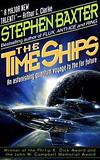


What it doesn’t do - not as much as The Time Machine, at least - is speculate on the problems of human cultures. This book has a lot of grand scientific speculation, from the possibility of diverging timelines to the possibilities of post-human life. As in the first book, he’s less a hero than a camera, a narrative device for looking at the odd worlds in which he finds himself. I found myself both admiring this - it’s good characterization, after all - and wishing that the Time Traveller would behave a bit more sympathetically in certain spots. He also feels like an Englishman from the late eighteen hundreds, perhaps a bit less prejudiced than some, but not as flexible as he needs to be. There’s a distinct sense that the story is being related after the narrator has already lived through it every now and again, after relating some theory or speculation, he’ll note that it turned out to be partly or mostly wrong. The narration of this book is modeled after the original. He theorizes that the Morlocks have to be responsible somehow, and when he sees a group of them around his halted time machine, he goes on the attack.

The Time Traveller lands in an inexplicably habitable world of darkness, understandably panicked. By telling his story, the Time Traveller changed history - Weena never existed - and worse than that, the altered timeline seems figuratively and literally darker.įirst, the seasons stop, then the rotation of the Earth grinds to a halt, and then the sun appears to explode. He intended to go back and rescue the Eloi named Weena, the only friend he’d made in the future, but physical law was against him.

The Time Ships repeats this scene from his perspective (in the original, we see it from the Writer’s point of view) and explains what happened to him. When The Time Machine ends, the nameless Time Traveller promises to be right back, departs for the future, and vanishes forever. To top The Time Machine, you’d pretty much have to invent a new genre. It’s a very good book, but it isn’t revolutionary in the way the original is - in part because it really can’t be. Wells’ The Time Machine, and that’s one of the most impossible legacies in science fiction. The Time Ships, by Stephen Baxter, is a sequel to H. It also has to carry over themes from the original, and ideally, it should measure up to the original - which is almost impossible, because classics tend to become classics because the ideas in them are unique, cutting edge, or at least presented in a fascinating new way. It’s not enough that it be a good book on its own. I’m even less sure how to proceed if that sequel happens to be for a classic. I’m not entirely sure how to review a sequel that’s written by a different author.


 0 kommentar(er)
0 kommentar(er)
